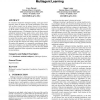63 search results - page 9 / 13 » Learning Situation-Specific Coordination in Cooperative Mult... |
IROS
2007
IEEE
15 years 6 months ago
2007
IEEE
— Multi-agent systems (MAS) are a field of study of growing interest in a variety of domains such as robotics or distributed controls. The article focuses on decentralized reinf...
114
click to vote
ATAL
2006
Springer
15 years 1 months ago
2006
Springer
In concurrent cooperative multiagent learning, each agent simultaneously learns to improve the overall performance of the team, with no direct control over the actions chosen by i...
111
click to vote
AI
2006
Springer
15 years 3 months ago
2006
Springer
Real world multiagent coordination problems are important issues for reinforcement learning techniques. In general, these problems are partially observable and this characteristic ...
107
click to vote
GECCO
2005
Springer
15 years 5 months ago
2005
Springer
This article describes a mathematical framework for characterizing cooperativity in complex systems subject to evolutionary pressures. This framework uses three foundational compo...
ATAL
2007
Springer
15 years 5 months ago
2007
Springer
Tags or observable features shared by a group of similar agents are effectively used in real and artificial societies to signal intentions and can be used to infer unobservable ...

